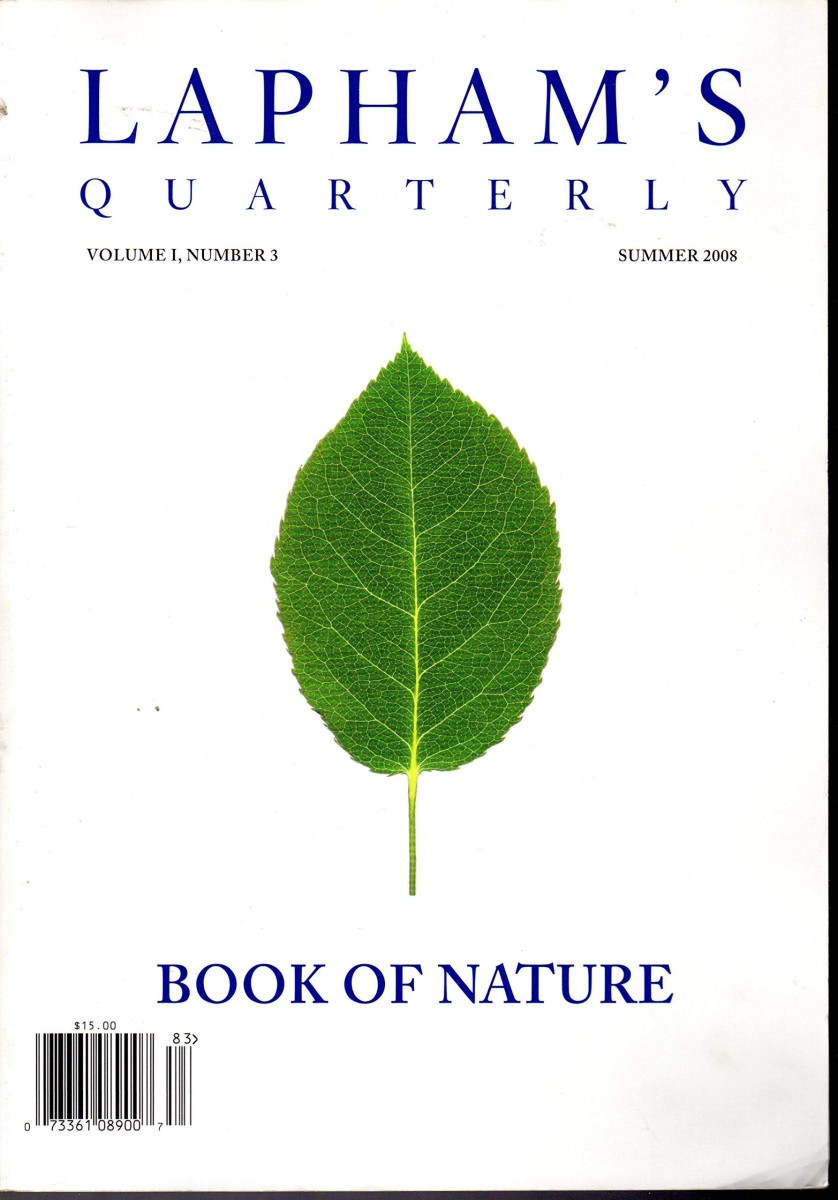I finally finished Lapham’s Quarterly’s Book of Nature yesterday. Work wasn’t too busy, the family was away and I got some serious reading done. Here are my favorites from this edition:
“Here is our long-forgotten family home.
And, having heard now and then the voice of ancestors calling,
Like a grey little forest bird, from far-away centuries,
I fly to you, Belovezhskaya Puschca.”
– Russian ballad by Aleksandra Pakhmutova, 1975
“Temperaments that possess a feeling for the sublime are drawn gradually, by the quiet stillness of a summer evening as the shimmering light of the stars breaks through the brown shadows of night and the lonely moon rises into view, into high feelings of friendship, of distain for the world, of eternity.”
– from “Observations” by Immanuel Kant
“Indeed, we seem to have no other criterion of truth and reason than the type and kind of opinions and customs current in the land where we live. There we always see the perfect religion, the perfect political system, the perfect and most accomplished way of doing everything.”
– from “Of Cannibals,” by Michel de Montaigne
“Main Street”- Nathaniel Hawthorne (Lengthy quote: has its own post – Click Here)
“The truth is, our idols are actually a great convenience to us. It is convenient that we can imagine a power beyond us because that means we don’t have to spend much time examining our own lives.”
– from “The Idols of Environmentalism,” by Curtis White
In a twist my mind came free and I was aware of the hard workings of the natural world beyond the periphery of ordinary attention, where passions lose their meaning and history is in another dimension, without people, and great events pass without record or judgement. I was a transient of no consequence in this familiar yet deeply alien world that I had come to love.
– from “Biophilia,” by E.O. Wilson
OCEAN, n. A body of water occupying about two-thirds of a world made for man – who has no gills.
– Ambrose Bierce, 1911
Over the last three centuries, the people of the Western world have defined progress as more of everything.
for two centuries manufacturing moved from resource to resource, from fishery to fishery, following an orderly conception of progress that took no responsibility for the disorder it caused
Charles Darwin’s theory of evolution revealed teh natural order to be a ferocious struggle for existence. The end result of hunting, starving, and locking horns with rivals turned out to be the evolving form of nature itself.
The fauna didn’t pop into existence on the fifth day of creation; they crawled out of a particular physical context consisting of climate, food, and other conditions that continually drive adaption and speciation. Life responds to its environment.
Anything that dies gives up its matter for recomposition into something else. If an economy operated on the same principle, it would not grow – at least not in teh same sense that we have known groth. It would produce no waste, deplete no species, and manufacture products with the ecological impact of bird dung. It would function, in other words, within envirnments rather than as parasites upon them.
– from “Pattern of Recognition,” by Steven Stoll
Idealism taken to the extreme is always genocide: the purse race, the utopian state, the rocking chair perched atop the mass grave. “They make a wilderness,” Tacitus wrote of the Roman imperial policy, “and call it peace.” You can destroy a wilderness and call it peace too.
For some two hundred years the samurai class of feudal Japan foreswore firearms, though the Japanese were aware of them and were expert gunsmiths.
the samurai didn’t like the devaluation of their courage in hand-to-hand combat, but they also didn’t like the posture that firing a matchlock required. It offended the sensibilities of a culture in which nearly every gesture had aesthetic criteria.
if a white whale should get your leg, resist the dream of his blowhole spouting blood, of hearing the old whalers’ cry of “Chimney’s afire!” That chimney is on your house.
Get a good prosthetic device, a circle of friends who know better than to talk too much about the sea, and, if the vineyards have not been utterly nibbled away, a few bottles of wine. Eat, drink, and be chivalrous, for tomorrow you die. As does the whale.
– from “And Such Small Deer,” by Garrett Keizer
